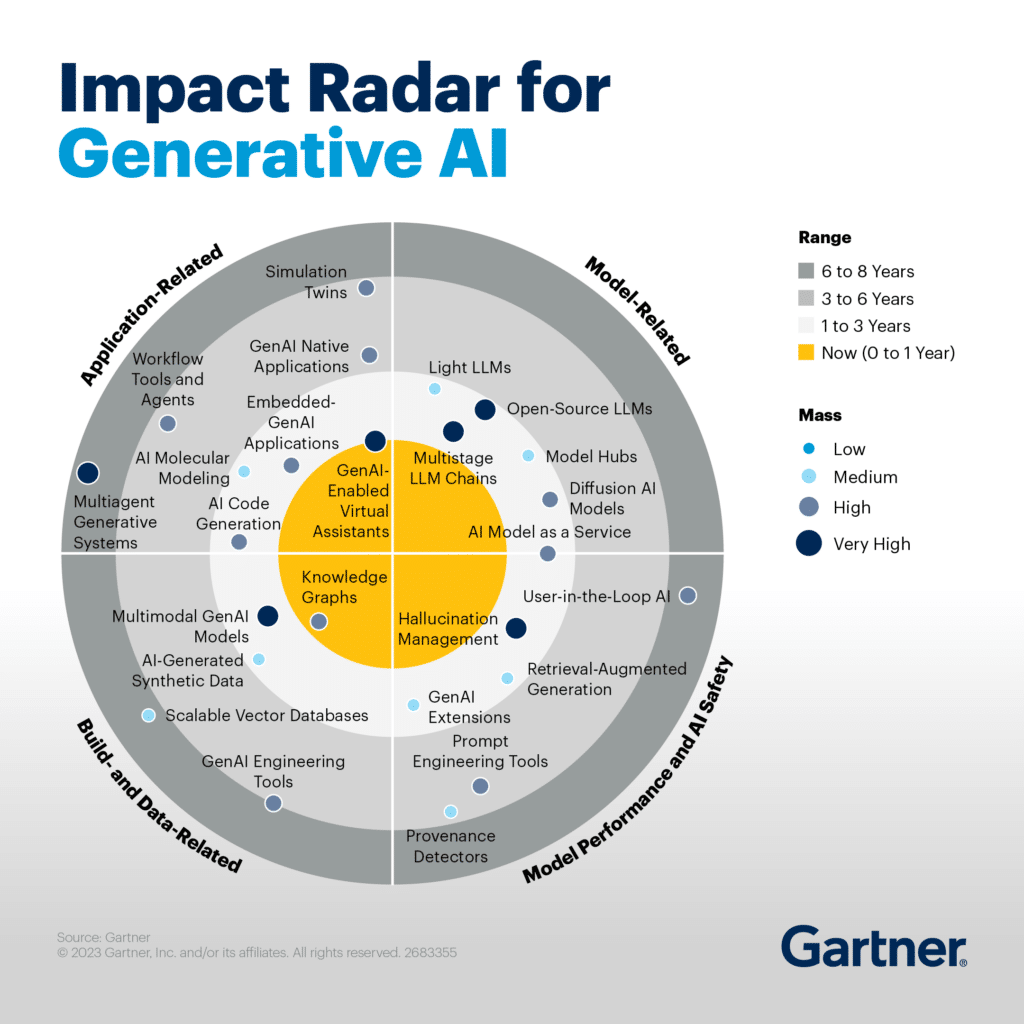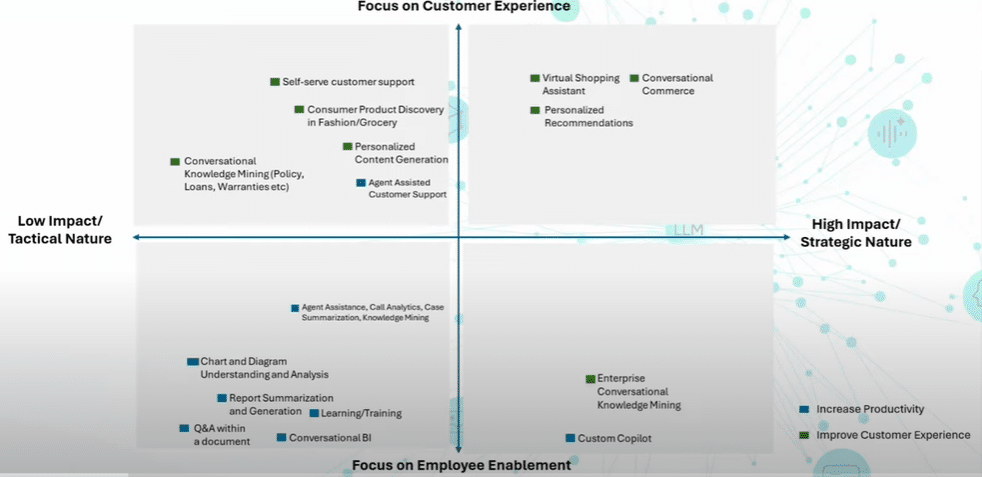
Data & AI Evangelist
Subscribe to the newsletter
Generative AI has experienced a meteoric rise in popularity over the past year and a half, largely driven by OpenAI’s release of ChatGPT. This public launch in late 2022 brought AI conversations into the mainstream, showcasing the power of large language models (LLMs) to understand and respond to diverse prompts in a natural, conversational manner. Since then, Generative AI has advanced rapidly, with new models and techniques evolving at an unprecedented pace, unlocking its vast potential for transforming customer interactions.
Generative AI chatbots have become a revolutionary force, transforming how businesses engage with customers through faster, more personalized, and highly engaging experiences and setting new standards for service excellence. To highlight this impact, Confiz hosted a webinar on “Streamlining Customer Interaction Using Generative AI Conversational Bots” to educate businesses on the potential of this technology.
Our webinar was powered by a dynamic lineup of visionary speakers who shared their expertise and provided invaluable strategies to help businesses leverage the most of generative AI. These speakers include:
- Jon Esmael, Director of Business Development at Confiz
- Umer Qadir, Director of Client Data Solutions at Confiz
- Sania Ashraf, Machine Learning Architect at Confiz
Let’s walk you through the brief recap of our webinar highlights.
Top Generative AI use cases
The webinar opened with a discussion on the applications of generative AI, focusing on how they address various business needs. We explored four key areas where generative AI can make a significant impact. These include:
- Boost in productivity: Generative AI enhances tasks such as using internal virtual assistants, improving developer efficiency, document analysis, business analytics, and learning.
- Process automation: AI helps streamline document processing, fraud detection, supply chain optimization, and compliance.
- Improved customer experience: It enables personalized customer experiences, intelligent contact centers, and improved accessibility.
- Creative content creation: AI supports content generation for marketing, personalized product development, and digital art creation.
Gartner impact radar for generative AI

Gartner Impact Radar for Generative AI is divided into four quadrants, each representing categories such as “Applications Related” and “Model Building.” The yellow area represents technologies expected to have a significant impact within the next 1 to 3 years, especially AI-powered virtual assistants. Virtual shopping assistants, conversational commerce, and personalized recommendations are amongst the highest-impact initiatives for generative AI to improve customer experience.
Generative AI bots empower sales teams by providing real-time information and automating routine tasks. Additionally, they assist HR departments in managing knowledge resources, ensuring employees have access to the latest information and training materials. These combined benefits increase efficiency, improve customer satisfaction, and enhance employee development. So, it is safe to say that these generative AI virtual assistants are highly relevant for businesses looking to streamline customer interactions using generative AI, as they enable more intelligent, context-aware, and reliable conversational bots.
Use case selection for generative AI conversation assistant

Businesses can select the use cases of generative AI conversational assistants based on their strategic value and impact, focusing on two areas: customer experience and employee enablement.
The top-right quadrant focuses on high-impact solutions that significantly improve customer interactions, such as virtual shopping assistants, conversational commerce, and personalized recommendations. The bottom-right quadrant includes high-impact solutions that enhance employee productivity, such as agent assistance, enterprise knowledge mining, and custom copilot.
The top-left quadrant features lower-impact tools like conversational knowledge mining and agent-assisted support, which provide tactical support for handling routine queries. The bottom-left quadrant is focused on providing employees with task-specific assistance, such as Q&A within a document, report summarization, and learning/training tools. These solutions offer incremental operational improvements.
By understanding these quadrants, organizations can identify the most suitable use cases for generative AI conversational assistants that align with their specific goals and strategic priorities.
Responsible AI use case accelerator model
In our “responsible AI use case accelerator model” section, selecting and delivering a generative AI use case requires aligning three key areas: data transformation, AI foundations, and responsible AI.
Data transformation focuses on ensuring your existing data is ready to support AI by integrating and enhancing it for smarter use cases. Building an AI foundation involves preparing your teams and organizational structures to embrace AI initiatives fully. Finally, responsible AI emphasizes ethical AI development, ensuring strong governance frameworks are in place to manage risks effectively. All these three disciplines converge to create real business value, forming a model for delivering impactful generative AI solutions.
Business value framework for Gen AI initiatives
We opt for a structured approach to select the first use case for your generative AI journey.
- Use case discovery
Begin by engaging stakeholders in workshops to discover potential use cases, assess their technical feasibility, and evaluate their maturity.
- Feasibility assessment
Conduct a feasibility assessment to score each case by ease of implementation.
- Value proposition definition
Determine its measurable value proposition—whether financial impact, process efficiency, or competitive advantage.
- Business impact mapping
Perform business impact mapping to define success criteria, establish KPIs, and set up a mechanism for ongoing impact monitoring. This approach ensures a clear, value-driven path for implementing generative AI solutions.
Real-world implementations and success stories
Our webinar also touched upon some of the transformative use cases we’ve successfully implemented for our clients. These projects have driven remarkable results, improving operational efficiency, enhancing customer experiences, and delivering measurable business value. Each use case showcases how generative AI, tailored to unique business needs, can seamlessly integrate into existing ecosystems and create a lasting impact.
Results in action: Enhancing customer satisfaction and acquisition with a generative AI virtual assistant for an outdoor and conservation company.
Beyond API access: Comprehensive generative AI development
The webinar further provided a deep dive into the technical intricacies of deploying generative AI bots to streamline customer interactions. Developing generative AI applications involves more than just utilizing APIs from pre-trained models like GPT-3.5 or Gemini. Businesses need to customize and enhance these models to address specific challenges, ensuring that AI effectively solves targeted problems.
Our webinar also covered advanced techniques like Retrieval-Augmented Generation (RAG) and how integrating them into scalable architectures enables companies to tailor AI solutions to their specific data and goals. Additionally, we showcased how virtual assistants can enhance efficiency and customer engagement, positioning AI as a game-changer for modern businesses.
Live demonstration: Catch our top generative AI solutions in action.
Click on the video link to watch our gen-AI use cases, which have boosted productivity, improved customer interactions, and made a real impact on our clients.
Looking to revolutionize your customer interaction, boost conversion rates, and streamline operations across various industries? Schedule a consultation with our experts today by contacting us at marketing@confiz.com.



